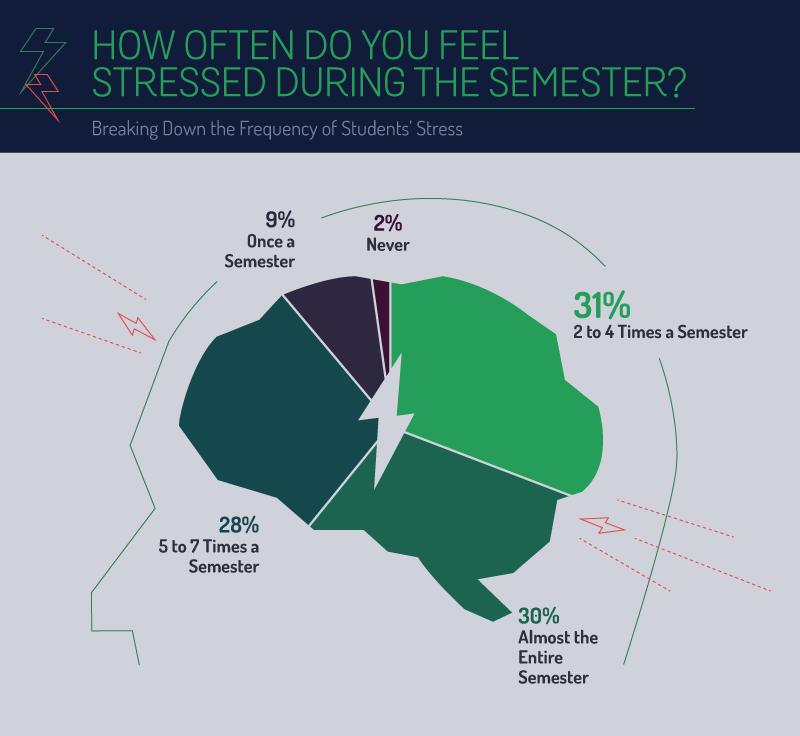Academic Stress
- Hanna Lee
- Mar 4, 2023
- 3 min read
As a student, I can confirm that academic stress is a prevalent issue within the educational environment. Not only have I observed classmates experiencing academic stress, but I have also personally experienced it. In this article, I will provide a range of effective strategies to help with stress and enhance mental and emotional well-being.

Identify the stress

Oftentimes the primary focus of a student is academics, striving to complete assignments and preparing for exams. However, in the process, we often neglect the importance of our mental and emotional health. Academic stress can be difficult to recognize, as we may become trapped in the world of studying and deadlines, unaware of its impact on our health. Not being able to identify academic stress may lead to long-term effects on our overall well-being. So, how do you know if you’re stressed or anxious?
Here are some signs of academic stress:
Agitation or fidgeting
Changes in eating and sleeping schedules
Not being able to concentrate
Negative thoughts and emotions
Physical aches and pains
If you start noticing these signs while completing assignments or studying for tests, you may be experiencing academic stress. This act of acknowledgement is essential and should not be a source of shame, as many students encounter similar challenges.
Focus on yourself

Academic stress can impact self-esteem. Here are three ways you can improve your self-esteem:
1. Practice self-care: It's important to take care of your physical health by monitoring your eating and sleeping habits. Lack of sleep can potentially lead to health issues, such as high blood pressure, heart attack, and sleep deprivation. Adding on, not eating enough during the day can make your body feel tired and weak. Food gives our bodies the energy we need to do everyday tasks. Make sure to get at least 7-8 hours of sleep each night and eat three nutritious meals a day!
2. Engage in positive self-talk: Negative thoughts can hold you back from reaching your full potential. Refrain from turning positive comments into negative ones, such as "Why am I so bad at this?" or "I'm always going to fail." Remember that everyone has their strengths, and it's crucial to try your best to accomplish the hard tasks.
3. Reward yourself: Taking a break to do activities you enjoy can help relax your body and mind after a hard exam. Participate in hobbies like baking, playing video games, or knitting. By doing this, you can power through academic stress. Think of it as a celebration!
How do you manage your time?

Time management is extremely important as a student. Sometimes it feels like there isn’t enough time in a day to complete every assignment that’s due. But, there are several ways to manage your time wisely. Below are three tips that students can use, no matter their age or grade level.
1. Create a set schedule:
To set a schedule, you should begin by prioritizing your tasks for the day. For example, if you have a 5-paragraph essay due in a week and a history project due in two weeks, you would want to focus on the essay before the project. To begin, plan out what you’ll accomplish for each day of the week. It’s recommended that you use a planner for this. Next, set achievable goals, think about how long you will be working, and take regular breaks to keep your mind fresh. Just by taking 10 minutes out of your day to create a schedule, your stress levels will reduce significantly.
2. Eliminate distractions:
In a modern world, it shouldn’t be a surprise that most teenagers have access to smartphones and other types of technology. As a teenager, it can be exciting to scroll through social media or to send funny text messages to a friend. But, it can also be a negative thing when it comes to schoolwork. Spending too much time on your smartphone can get you distracted and unmotivated to do your assignments. Especially with so much content on the internet, it can often create a whole different category of stress. Instead, take small breaks between assignments to check your smartphone. With limited time to accomplish your schoolwork, controlling your distractions can help with academics.
3. Focus on one task at a time:
According to studies, multitasking is a myth. Earl Miller is a neuroscience professor who has studied the concept of multitasking. His research has shown that we simply cannot focus on two things at the same time. Instead, we use a technique known as “task-switching.” Even though we can switch tasks quickly, it is very inefficient. You can lose up to 40% of your productivity due to task-switching. So, while completing assignments or studying for exams, put all your attention on one thing at a time.
Academic stress is a common issue that can have significant consequences if left unaddressed.
By identifying the symptoms, improving self-esteem, and working on time management, you'll be able to succeed. Make sure to prioritize your health and well-being above all!
Sources (Information):
Sources (Images):
Comments